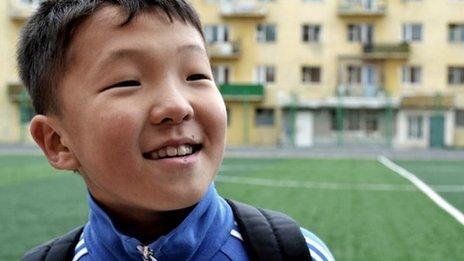The coach who's hoping to transform Mongolian football
- Published
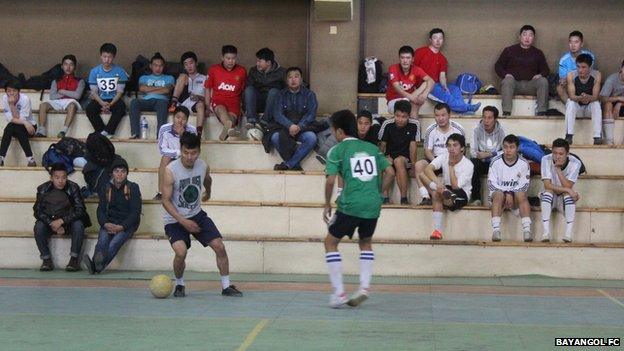
The first trials for Bayangol FC were held in Ulan Bator
If you want a career in football, Mongolia is perhaps not the obvious place to go - but that's exactly where British coach Paul Watson is setting up a new team entirely from scratch. He is already finding fresh talent and hopes to inspire the country's next generation of players.
In July, Paul Watson got an email from a stranger in the Mongolian capital, Ulan Bator - Enkhjin Batsumber wanted to know if he was interested in helping him start a new football team, Bayangol FC.
The job offer didn't come as a total shock - in the past Watson had coached the world's lowest ranked national team on the Micronesian island of Pohnpei and had written a book about the experience.
He felt the new Mongolian Premier League "was making a massive effort to bring the game into a more modern and more Western model, and I could see there was a lot of passion", he says.
Although watching football is very popular in Mongolia - many fans support the top European clubs - people feel it's a "foreign phenomenon", says Watson.
"They can't really play, and [they feel] that playing doesn't lead to anything... I like to take on challenges where you can actually make a bit of a difference."
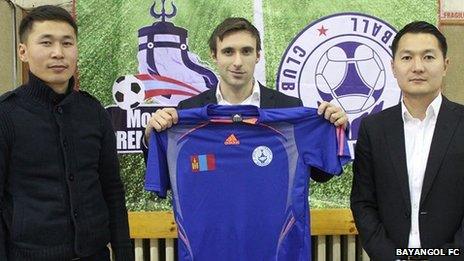
Paul Watson (centre) with club directors, Tulga Tuvshinjargal (left) and Enkhjin Batsumber (right)
New approach
In Mongolia, Watson found professional players tended to be in their late 20s and early 30s - and he wanted to give younger people a chance to play professionally much earlier in their lives.
"I really want to bring a belief to the kids here that if they try hard enough, and they work hard enough, they can make it at a good level," he says.
"I know it's silly to set goals that are too high but I honestly believe there's a potential for Mongolia to be at least 100 places up in the rankings from where they are at the moment." Right now, Fifa ranks Mongolia 180 out of 209 countries.
Watson is holding public try-outs across the country - a novel approach in Mongolia, where players don't always have the right contacts to get into the game professionally.
He has held two sessions in Ulan Bator - 60 people came to the first one. He plans to hold more trials in the city of Darkhan 225km (140 miles) to the north, and in Sainshand 450km (280 miles) away in the south.
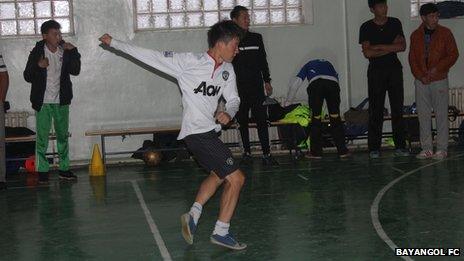
Ochiroo Batbold hopes to learn from the more experienced players in the team
One of his new protegees is 16-year-old Ochiroo Batbold who gets up at 05:30 every morning and makes his way to the school gym where he trains, usually alone, for two hours before class. "My dream is to become a professional football player and play at Old Trafford," he says.
Batbold had never had any coaching or formal training but his passion and determination have clearly impressed Watson, who wants him in his squad.
"I have never had this opportunity before, I have never played in a team before, so this is quite a different experience," says Batbold.
Transparency
Another player to make it through the first round of the selection process is 23-year-old estate agent Davaadorj Sukhbaatar.
He started kicking a ball around in primary school and as a child would play whatever the weather - even in the snow.
He studied in the US for four years before he returned to Mongolia where he joined another team, but he wasn't impressed with the way it was run.
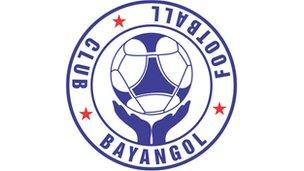
"Once our team was winning a game 3-0 and the coach suddenly said he wanted to play - he wanted to change his clothes and play. He even had his own jersey."
Sukhbaatar felt there was no transparency in the way players were selected and how they were treated, so he left the team and never planned to return to football until he heard about Bayangol.
"This is what I have been waiting for," he says, "this is what we need in Mongolia."
After the first round of try-outs the candidates will be whittled down further to a final squad of around 30 players.
The whole process is being filmed for a reality TV show which will be broadcast from Monday 13 January, and a local company that makes Frutta, a soft drink, has signed up as a sponsor.
The players will be paid - although the exact amount hasn't been finalised yet. With training just three times a week, youngsters who are still at school will be encouraged to stay in education and people in work won't be asked to give up their jobs.
"We have big aspirations and we are hoping this could become a full-time career for all of these guys, but it would be really foolish to let people build their lives in that way just in case that isn't the case," says Watson.
Paul Watson spoke to World Update on the BBC World Service.
- Published4 September 2023
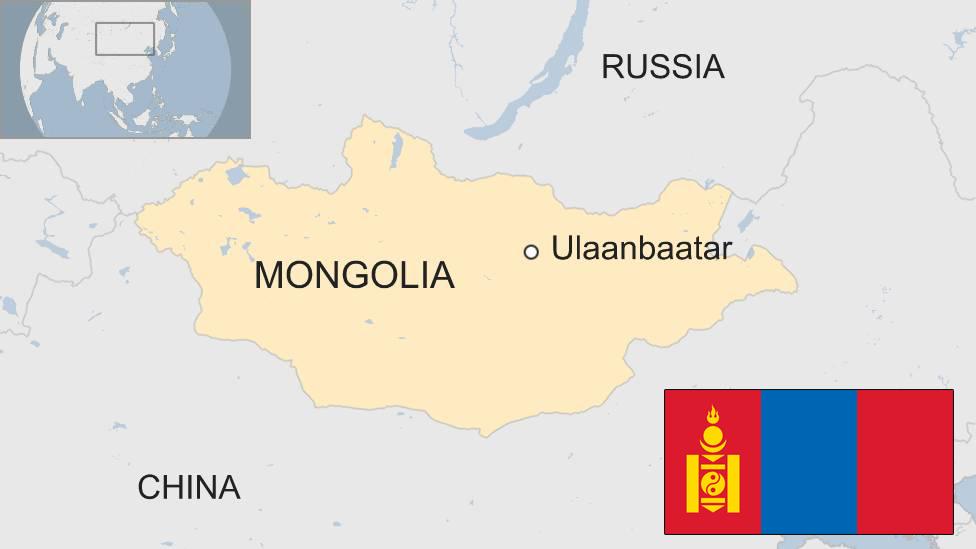
- Attribution
- Published15 May 2012
